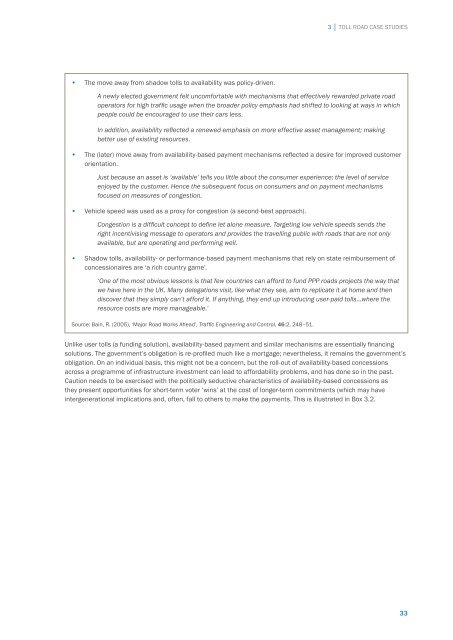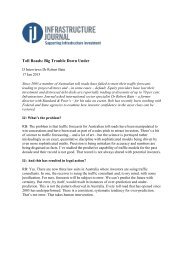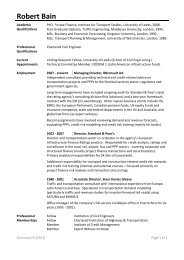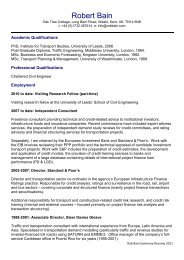Disincentivising overbidding for toll road concessions
Disincentivising overbidding for toll road concessions
Disincentivising overbidding for toll road concessions
- No tags were found...
Create successful ePaper yourself
Turn your PDF publications into a flip-book with our unique Google optimized e-Paper software.
3 │ TOLL ROAD CASE STUDIES<br />
••<br />
The move away from shadow <strong>toll</strong>s to availability was policy-driven.<br />
A newly elected government felt uncom<strong>for</strong>table with mechanisms that effectively rewarded private <strong>road</strong><br />
operators <strong>for</strong> high traffic usage when the b<strong>road</strong>er policy emphasis had shifted to looking at ways in which<br />
people could be encouraged to use their cars less.<br />
In addition, availability reflected a renewed emphasis on more effective asset management; making<br />
better use of existing resources.<br />
••<br />
The (later) move away from availability-based payment mechanisms reflected a desire <strong>for</strong> improved customer<br />
orientation.<br />
Just because an asset is ‘available’ tells you little about the consumer experience; the level of service<br />
enjoyed by the customer. Hence the subsequent focus on consumers and on payment mechanisms<br />
focused on measures of congestion.<br />
••<br />
Vehicle speed was used as a proxy <strong>for</strong> congestion (a second-best approach).<br />
Congestion is a difficult concept to define let alone measure. Targeting low vehicle speeds sends the<br />
right incentivising message to operators and provides the travelling public with <strong>road</strong>s that are not only<br />
available, but are operating and per<strong>for</strong>ming well.<br />
••<br />
Shadow <strong>toll</strong>s, availability- or per<strong>for</strong>mance-based payment mechanisms that rely on state reimbursement of<br />
concessionaires are ‘a rich country game’.<br />
‘One of the most obvious lessons is that few countries can af<strong>for</strong>d to fund PPP <strong>road</strong>s projects the way that<br />
we have here in the UK. Many delegations visit, like what they see, aim to replicate it at home and then<br />
discover that they simply can’t af<strong>for</strong>d it. If anything, they end up introducing user-paid <strong>toll</strong>s...where the<br />
resource costs are more manageable.’<br />
Source: Bain, R. (2005), ‘Major Road Works Ahead’, Traffic Engineering and Control, 46:2, 248–51.<br />
Unlike user <strong>toll</strong>s (a funding solution), availability-based payment and similar mechanisms are essentially financing<br />
solutions. The government’s obligation is re-profiled much like a mortgage; nevertheless, it remains the government’s<br />
obligation. On an individual basis, this might not be a concern, but the roll-out of availability-based <strong>concessions</strong><br />
across a programme of infrastructure investment can lead to af<strong>for</strong>dability problems, and has done so in the past.<br />
Caution needs to be exercised with the politically seductive characteristics of availability-based <strong>concessions</strong> as<br />
they present opportunities <strong>for</strong> short-term voter ‘wins’ at the cost of longer-term commitments (which may have<br />
intergenerational implications and, often, fall to others to make the payments. This is illustrated in Box 3.2.<br />
33






